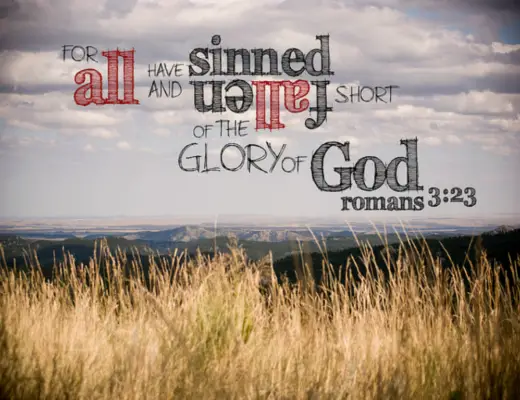Even now- this is the Lord’s declaration – turn to Me with all your heart, with fasting, weeping, and mourning. Tear your hearts, not just your clothes, and return to the Lord your God. For He is gracious and compassionate, slow to anger, rich in faithful love, and He relents from sending disaster.
Joel 2:12-13
The Day of the Lord
Three launchpads for meditation. The first launchpad explores the day of the Lord theme traced throughout the Bible.
Although the day of the Lord may conjure up images of the end times, within the Bible, the theme is broader. It pertains to how the Lord restores his intended order and justice, not only during final judgement but also throughout history. For those who have been wronged, it is a joyful time of restoration. But for the oppressors of the world, it is a day of reckoning. Because during the day of the Lord, there is both judgement and salvation.
For the Israelites, with their covenant relationship with God, they viewed themselves as on the favorable side of the day of the Lord. Israel expected their enemies to bear the shame of destruction and for God to bring His covenant people to a place of honor among the nations. And given the Israelite’s history, it was not an unreasonable expectation. For example, when the Israelites escaped from Egypt the punishment of Egypt was viewed as a day of the Lord. Egypt was punished while Israel was saved.
However, Joel 2:12-13 is to be understood within the context of the day of the Lord bringing judgement upon Israel rather than Israel’s oppressors. Verse 11 reads, “The Lord raises His voice in the presence of His army. His camp is very large; Those who carry out His command are powerful. Indeed, the Day of the Lord is terrible and dreadful— who can endure it?”
In Exodus, swarms of locusts brought the day of the Lord upon Egypt. But in Joel, swarms of locusts as powerful as an invading army bring the day of the Lord upon Israel. Whether a literal or figurative locust plague, the warning is clear. The Lord will bring judgement upon Israel.
The “even now” at the start of verse 12 connects with the day of the Lord warning in verse 11. This is the Israelites’ last chance to turn from their sin and return to their covenant relationship with God. But as we will see, the way Israel should repent is important.
Fasting, Weeping, and Mourning
The second launchpad for meditation explores how Israel is to turn back to their God.
In verse 12, Israel is told to return to their God with fasting, weeping, and mourning. Elsewhere in the Old Testament, this collection of acts is undergone by a community in grief- turning to God to act in the face of looming destruction. For example, facing a decree from the king to kill all the Jewish people, Esther 4:3 describes the response as one where “in every province to which the edict and order of the king came, there was great mourning among the Jews, with fasting, weeping and wailing. Many lay in sackcloth and ashes.”
Similarly, in the book of Jonah, the Ninevites hear the warning of impending destruction and repent with fasting and self-abasement. In Joel, the Israelites are called to do the same- to fast, weep, and mourn over their sin and to turn back to God.
While Joel 2:12 confirms the appropriateness of fasting and mourning over sin before God, Joel 2:13 suggests that the outward expressions must be genuine. The Israelites are told to tear their hearts, not only their clothes. The outward actions of fasting, weeping, and tearing one’s clothes are symbols of a broken heart. Although for the Israelites, wholehearted repentance would include outward actions, the outward actions are meaningless if they are not accompanied by inward repentance. Psalm 51:17 echoes the importance of a genuine heart of repentance: “The sacrifice pleasing to God is a broken spirit. God, You will not despise a broken and humbled heart.”
God is Gracious and Compassionate
The third launchpad for meditation mulls over why there is hope in returning to the Lord. Is the fasting, weeping, mourning, and torn up heart fundamentally what will deter disaster? No, the hope in turning back is not rooted in what the Israelites do, but in who the Israelites are turning to.
The Israelites have hope if they repent because their God is gracious and compassionate, slow to anger, and rich in faithful love. It is how God revealed himself to Moses in Exodus chapter 34: “the Lord, the Lord, the compassionate and gracious God, slow to anger, abounding in love and faithfulness, maintaining love to thousands, and forgiving wickedness, rebellion and sin.”
It is in God’s compassionate nature to delay harm and judgement. For example, consider the prophet Jonah who wanted to see the destruction of the city he was called to warn. Jonah did not want to go to the city because he knew God’s grace is eager to hold off on judgement. The frustrated prophet explains his reasoning in Jonah 4:2 – “He prayed to the Lord: “Please, Lord, isn’t this what I said while I was still in my own country? That’s why I fled toward Tarshish in the first place. I knew that You are a merciful and compassionate God, slow to become angry, rich in faithful love, and One who relents from sending disaster.”
The prophet Jonah was upset because the compassionate and merciful Lord relents from sending disaster on Israel’s enemies. But the Israelites should rejoice that the Lord extends to them the same compassion and mercy. Because the gracious character of the Lord is the only reason for hope through repentance. Salvation is not achieved through works- it is a gift from a gracious God.
So, my prayer today is that I would lean into the Lord’s character as the only hope for salvation. But that I would not take the Lord’s mercy, grace, and love for granted. That instead, I would turn back to God with a broken, contrite heart overflowing in mourning over sin.
Joel 2:12-13 Study Resources
A Survey of the Old Testament (Hill and Walton 2009):
Day of the Lord (The Bible Project 2017):
Joel and Amos (Tyndale Old Testament Commentaries) (Hubbard 2009):
The Books of Joel, Obadiah, Jonah, and Micah (NICOT) (Allen 1976):
Word Biblical Commentary Vol. 31, Hosea-Jonah (Stuart 1987):



